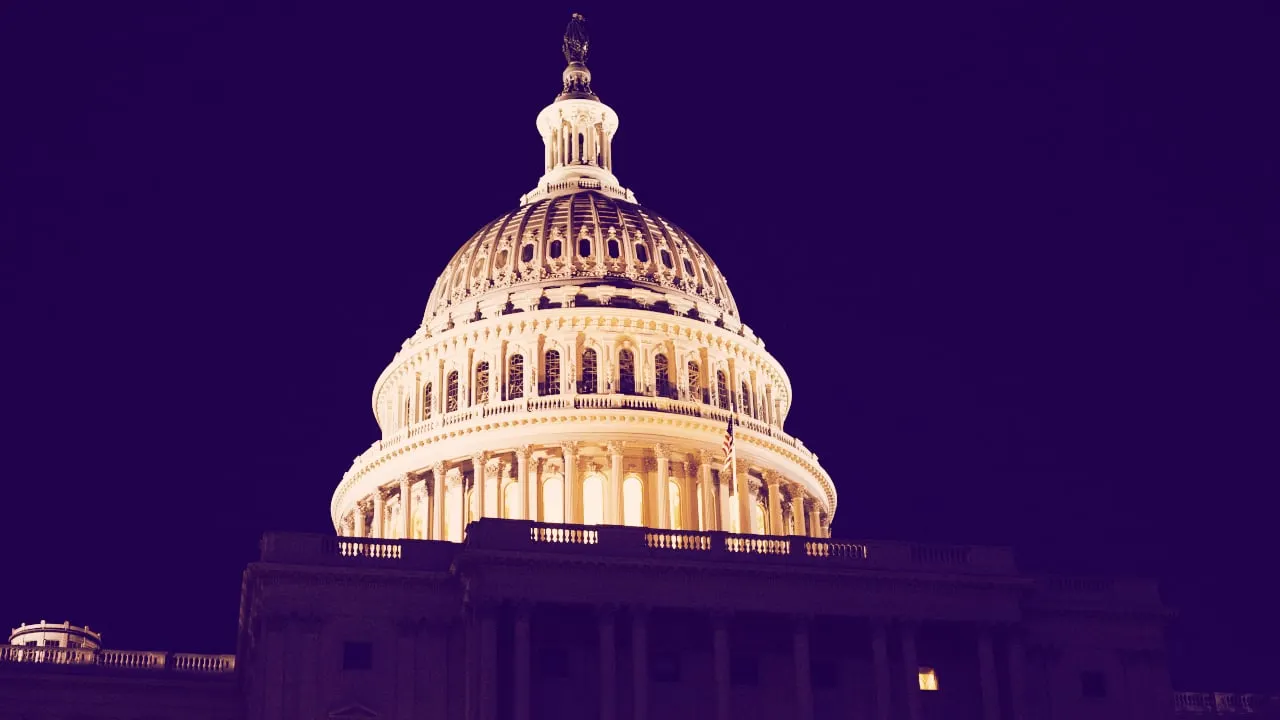In brief
- The tone of Congress towards crypto was markedly changed from past years.
- Crypto executives received encouragement from both Democrats and Republicans with one exception.
Top executives from Coinbase, Circle and four other cryptocurrency firms appeared before members of Congress on Wednesday—an event that in past years would have triggered indignation and scoldings. Instead the crypto execs were greeted with curiosity and even encouragement.
The five-hour hearing took place before the U.S. House Committee on Financial Services where six CEOs, including Sam Bankman-Fried of FTX, testified about the growing importance of crypto and the industry's desire for regulation.
While such hearings in the past have focused almost entirely about the criminal use of Bitcoin, Wednesday's session saw members inquire about everything from the security advantages of blockchain technology to the potential for crypto to provide greater financial inclusion.
"Web3 can empower anyone," said Rep. Anthony Gonzalez (R-Oh), using a relatively new term that describes an emerging stack of applications that don't rely on a centralized authority to function.
Gonzalez and others repeatedly invoked the prospect of the U.S. losing out on crypto-related innovation as a result of cumbersome regulation, and asked if the industry would benefit from a more cohesive policy from the U.S. government.
The crypto CEO, unsurprisingly, agreed with the sentiment and urged Congress to clarify the overlapping jurisdictions between agencies like the SEC and CFTC, and to allow companies like Circle—which has issued more than $30 billion in stablecoins—to come into existing banking system.
The committee members and crypto executives also noted on numerous occasions that other countries, including Canada, have allowed products like a Bitcoin ETF even as the U.S. continues to bar them.
"If a whole bunch of customers want to buy a Bitcoin ETF, why won’t we let them?" asked Rep. Bryan Steil (R-WI), who then asked Alesia Haas, Coinbase's CFO and US CEO, if the company had asked the SEC for details about why the agency has told it why it can't issue a lending product tied to stablecoins, tokens that are pegged to fiat currencies such as the U.S. dollar.
"We have [asked] and we still do not have clarity on why our product can’t proceed," replied Haas.
Some Democrats on the committee took a more skeptical view of the crypto industry, with Rep. Rashida Tlaib (D-MI) asking about Bitcoin mining's growing carbon footprint, while Reps. Sylvia Garcia (D-Tx) and Alma Adams (D-NC) both pressed the companies to provide data about diversity in their corporate ranks and user base—a request to which every CEO agreed.
But even as they expressed such concerns, the Democratic members praised the potential for crypto and blockchain wallets to provide lower-cost alternatives to the existing banking system. Rep. Ritchie Torres (D-NY), who represents one the country's poorest district's in the South Bronx, described how crypto offered a cheaper and faster way for many of his constituents to send remittance payments.
Meanwhile, both Republicans and Democrats raised concerns about whether quantum computing may pose a threat to blockchain security, and whether crypto might undermine the U.S. dollar as the world's reserve currency—though while also expressing support for the technological potential of crypto.
Only one member of the Committee, Rep. Brad Sherman (D-CA), broke from the cordial tone of the hearing, mocking the crypto industry for adopting a "vibe [of] stick it to the man" while allegedly receiving support from powerful Wall Street interests. Sherman also blasted Coinbase for sending Haas rather than its top executive, Brian Armstrong, suggesting that Armstrong would eventually have to experience hearings like ones Congress has meted out to Facebook CEO Mark Zuckerberg.
While Sherman's withering attitude to crypto would have become in Congress even three years ago, his comportment on Wednesday made him an outlier among the other members of the committee.
The tenor of the hearing won praise from many in the crypto community who have often expressed frustration with perceived hostility and lack of knowledge among members of Congress.
Today's HFSC hearing was the most positive, constructive, & bipartisan public event on crypto I've seen in Congress — ever. I mean that literally.
It's a testament to the effectiveness of industry & community engagement in DC in recent months. We've made shockingly big progress.
— Jake Chervinsky (@jchervinsky) December 8, 2021
It is not immediately clear what the upshot of Wednesday's hearing will be, though several members of the Committee declared they would being working on bills to streamline crypto regulation and support the industry.
"The rules of the road for Web3 can be bipartisan," said Jake Auchincloss (D-MA).

